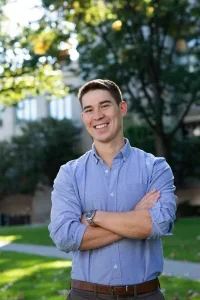By Harvard Law School Student Nathan Lowry
Many Legal Services Center (LSC) veteran clients served in America’s wars in Afghanistan and Iraq. In most cases, these veterans deployed years, and in some cases, decades ago. Despite the passage of time, LSC’s Veterans Law and Disability Benefits Clinic clients grapple with the difficulty of transitioning from the military to the civilian sector. These veterans struggle to acquire benefit entitlements, find gainful employment, and move on from their harrowing experiences abroad.

Over the last year, I’ve been fortunate to work with an Army veteran, Brian,* who deployed to Iraq in 2004, experienced horrific combat, and is still struggling to recover from the invisible wounds he incurred during his service. As a result of his post-traumatic stress disorder and traumatic brain injury, Brian has struggled with substance abuse and homelessness. LSC is representing Brian to litigate his access to benefits via the federal Department Veterans Affairs and the state Massachusetts Chapter 115 programs. These benefits are intended to ease his transition from his military service.
In working with Brian, I’ve been able to author motions, conduct pre-hearing conferences with opposing counsel, and even conduct oral arguments on Brian’s behalf. As a transitioning Marine veteran who deployed abroad—albeit one who fortunately did not have to contend with the horrific combat Brian endured—my work with Brian is intended to provide him with access to benefits that will help him regain his footing in the civilian world. However, in working together, Brian has helped my transition from the military to lawyering as much as I have helped him. Under the tutelage of Dan Nagin and Dana Montalto at LSC, my experience representing Brian has helped me translate the skills I developed in the Marine Corps to the cerebral, often mystifying, world of litigation.
In the military, I found months of training in the U.S. could never replicate the reality of an operational environment while deployed abroad, whether in Afghanistan, West Africa, or Europe. My experience with LSC indicates lawyering is no different. By serving an actual client with pressing needs, I learned more in a few weeks with LSC than I did in a full semester in many of my black letter law courses. On a daily basis, I addressed real legal considerations, including case strategy and negotiation techniques with opposing counsel. Like operational decisions in the military, I found that there is rarely a “right” answer and that each decision presents a cascade of competing considerations, some of which result in unintended consequences.
The dynamic nature of client services cannot be replicated in the sterile environment of a classroom. A two-page “reaction paper” cannot simulate the painstaking edits necessary to ensure each word in a motion furthers a client’s quest to acquire desperately needed benefits. A lecture in Legislation and Regulation cannot replace the frantic scramble to digest and counter an opposing counsel’s faulty statutory interpretation of a state regulation amid a prehearing conference. A 30-second cold call does not provide the same benefits as a 10-minute oral argument and subsequent questioning from a magistrate. Nor can it replicate the weeks of preparation for that argument in the form of drafting outlines and moot arguments. Rather than learning via reading and class notes that culminate in a three-hour exam, LSC provides the opportunity to learn, sharpen, and test advocacy skills in a real environment with concrete consequences. The gravity of these consequences ensures the lessons a student gleans from work at LSC are indelible.
Ownership is also a tenet that the Marine Corps emphasized at every step, from entry level training to combat deployments. LSC’s emphasis on student ownership of cases similarly creates an organization that achieves results while also providing an environment conducive to learning. As Rule 303 attorneys, students are the chief representatives for LSC clients. In working with Brian, I was his chief point of contact via telephone and Zoom, his primary representative on email correspondence with opposing counsel and state/federal agencies, and I was his legal advocate in official proceedings. This system promotes a sense of responsibility and encourages initiative, both of which will serve students long after law school.
However, while students own the cases, they have access to selfless, seasoned supervisors. My primary supervisor and the director of LSC, Dan Nagin, was available late at night, early in the morning, and on the weekends. He provided granular edits on all my work, both for Brian’s benefit and my own benefit. Dan went sentence by sentence through summary decision and opposition motions, often turning around dozens of versions of the same document to ensure we were representing Brian to the fullest. Time is the most precious thing that busy leaders can provide; like the best leaders I worked with in the Marines, Dan always made himself available to discuss feedback, strategy, and any other considerations.
Furthermore, his and Dana Montalto’s feedback was specifically geared to my background. While my experiences briefing intelligence and operational information in the Marine Corps made me accustomed to speaking in measured, controlled tones, both Dana and Dan helped me use that skill to succinctly convey information before the Court while simultaneously encouraging me to alter my inflection during moments of emotional emphasis.
Ultimately when I look back at my three years of HLS, I feel my work with Brian and other LSC clients has had the biggest impact on others. However, the opposite is also true. Ultimately, the practical lawyering considerations I contended with at LSC and the legal advocacy skills I developed as a result will stick with me long after any memorized classroom outlines or mid-semester papers.
*Client’s name has been changed for confidentiality.
